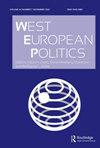Mummy’s girls, daddy’s boys: the gendered transmission of political engagement in families
IF 3.6
1区 社会学
Q1 POLITICAL SCIENCE
引用次数: 0
Abstract
AbstractDespite gains in women’s education, workforce participation, and leadership roles, a gender gap in political self-efficacy persists across European nations. Women consistently report lower confidence in their ability to participate in and understand politics compared to their male counterparts. This study posits that, although society inherently signals to boys their place in politics, a politically engaged mother can counteract this by providing her daughter with a positive role model and fostering her interest in politics, thereby bolstering the daughter’s political self-efficacy. Drawing from survey data of 15–16-year-old Finnish students (n = 5220) from 2021, the findings reveal two critical insights: fathers tend to boost political self-efficacy more in sons than in daughters. In contrast, the political engagement of mothers has a stronger positive association with their daughters’ confidence in politics. Moreover, parents’ political involvement fosters political interest in their children, which then enhances the latter’s sense of political self-efficacy.Keywords: Political self-efficacygenderpolitical engagementadolescents Disclosure statementNo potential conflict of interest was reported by the author(s).Notes1 Table A1 in the appendix addresses potential gender differences in assessing parents’ political engagement. For example, gender roles may influence how boys and girls evaluate their parents. However, the differences are generally small. First, daughters tended to have more positive evaluations of both their parents’ political engagement. For the first three items, both sons and daughters rated their fathers’ political engagement more positively than their mothers’, but the gaps were, at most, 0.03 points greater among sons. Sons also had more favourable evaluations of their fathers’ encouragement on discussing political and social issues. Daughters, on the other hand, reported that their mothers were more encouraging in making independent decisions, with a gap of 0.12 points. In terms of the indexes, sons had somewhat more positive evaluations of their fathers’ engagement, while daughters had more positive evaluations of their mothers’ engagement.Additional informationFundingThis work was supported by the project Education, Political Efficacy and Informed Citizenship (EPIC), funded by Academy of Finland (project number 323608).Notes on contributorsElina Kestilä-KekkonenElina Kestilä-Kekkonen is an Associate Professor of Political Science at Tampere University and one of three principal investigators of the 2023 Finnish National Election Study. Her main research interests are political socialisation and inequalities in political engagement. She has published in journals such as European Journal of Political Research, European Political Science Review and Journal of Elections, Public Opinion and Parties. [elina.kestila-kekkonen@tuni.fi]Josefina SipinenJosefina Sipinen is a post-doctoral researcher affiliated with both the Faculty of Management and Business at Tampere University and the Faculty of Social Sciences at the University of Helsinki. Her research delves into political engagement, political representation, and the political socialisation of migrants, youth, and women. She has published in Party Politics, Journal of Elections, Public Opinion and Parties, and European Societies, among others. [josefina.sipinen@tuni.fi, josefina.sipinen@helsinki.fi]Peter SöderlundPeter Söderlund is an Associate Professor of Political Science at Åbo Akademi University. His research has focused on political attitudes, voting behaviour, and electoral systems. He has published articles in journals such as Political Behaviour, European Journal of Political Research, and West European Politics. [peter.soderlund@abo.fi]妈妈的女孩,爸爸的男孩:家庭政治参与的性别传递
摘要尽管女性在教育、劳动力参与和领导角色方面取得了进步,但在欧洲国家,政治自我效能的性别差距仍然存在。与男性相比,女性对自己参与政治和理解政治的能力的信心一直较低。这项研究认为,虽然社会固有地向男孩发出他们在政治中的地位的信号,但参与政治的母亲可以通过为女儿提供积极的榜样和培养她对政治的兴趣来抵消这种影响,从而增强女儿的政治自我效能感。根据2021年对15 - 16岁芬兰学生(n = 5220)的调查数据,研究结果揭示了两个关键的见解:父亲倾向于提高儿子的政治自我效能感,而不是女儿。相比之下,母亲的政治参与与女儿的政治信心有更强的正相关。此外,父母的政治参与培养了子女的政治兴趣,进而增强了子女的政治自我效能感。关键词:政治自我效能;性别政治参与;青少年披露声明作者未报告潜在的利益冲突。注1附录表A1说明了在评估父母政治参与程度时可能存在的性别差异。例如,性别角色可能影响男孩和女孩如何评价他们的父母。然而,差异通常很小。首先,女儿对父母的政治参与往往有更积极的评价。在前三个项目中,儿子和女儿对父亲政治参与的评价都比母亲积极,但儿子的差距最多只比母亲大0.03分。儿子们对父亲鼓励他们讨论政治和社会问题的评价也更高。另一方面,女儿们报告说,她们的母亲在做独立决定方面更鼓励她们,差距为0.12分。从指标上看,儿子对父亲订婚的评价较为正面,女儿对母亲订婚的评价较为正面。本研究由芬兰科学院资助的教育、政治效能和知情公民(EPIC)项目(项目编号323608)支持。selina Kestilä-KekkonenElina Kestilä-Kekkonen是坦佩雷大学政治学副教授,也是2023年芬兰全国选举研究的三位主要调查员之一。她的主要研究兴趣是政治社会化和政治参与中的不平等。她曾在《欧洲政治研究杂志》、《欧洲政治科学评论》和《选举、舆论和政党杂志》等期刊上发表文章。[elina.kestila-kekkonen@tuni.fi]Josefina Sipinen enjosefina Sipinen是坦佩雷大学管理与商业学院和赫尔辛基大学社会科学学院的博士后研究员。她的研究领域包括政治参与、政治代表以及移民、青年和妇女的政治社会化。她曾在《政党政治》、《选举杂志》、《公众舆论与政党》、《欧洲学会》等刊物上发表文章。[josefina.sipinen@tuni.fi, josefina.sipinen@helsinki.fi]彼得SöderlundPeter Söderlund, Åbo学术大学政治学副教授。他的研究重点是政治态度、投票行为和选举制度。他曾在《政治行为》、《欧洲政治研究杂志》和《西欧政治》等期刊上发表文章。(peter.soderlund@abo.fi)
本文章由计算机程序翻译,如有差异,请以英文原文为准。
求助全文
约1分钟内获得全文
求助全文
来源期刊

West European Politics
POLITICAL SCIENCE-
CiteScore
10.00
自引率
7.10%
发文量
58
期刊介绍:
West European Politics (WEP)has established itself as one of the most authoritative journals covering political and social issues in Western Europe. It has a substantial reviews section and coverage of all national elections in Western Europe. Its comprehensive scope, embracing all the major political and social developments in all West European countries, including the European Union, makes it essential reading for both political practitioners and academics.
 求助内容:
求助内容: 应助结果提醒方式:
应助结果提醒方式:


